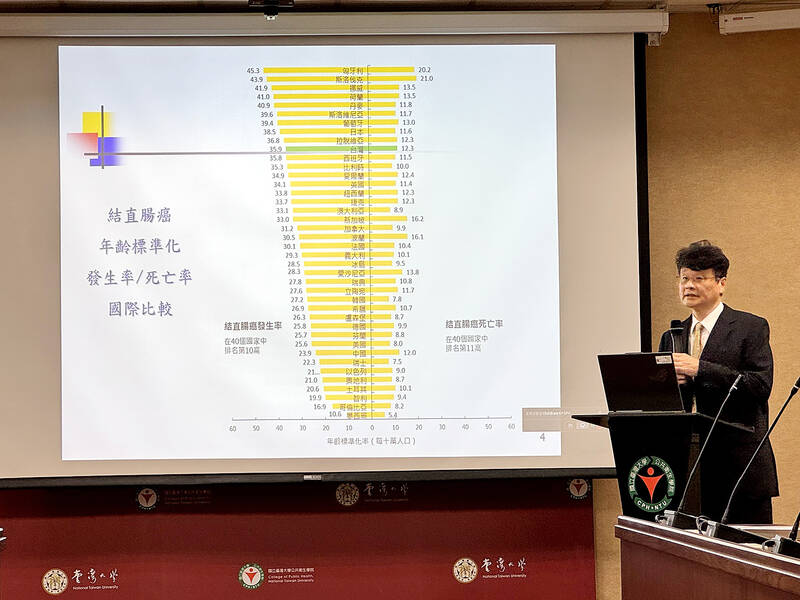A National Taiwan University (NTU) study shows a positive correlation between the diagnoses of colorectal cancer and screening, suggesting that the age at which colon cancer should be screened should be lowered to 45, which could reduce the number of colorectal cancer diagnoses by 1,800 within the next decade.
Using the Age-Period-Cohort-Screening model, the study showed that Taiwan’s colorectal cancer screening policies had lasting long-term effects on colorectal cancer occurrence rates, said NTU College of Public Health professor Lee Wen-chung (李文宗).
In 2004, the government only screened people aged 50 to 69, with only 4.8 percent of people in that group being screened, Lee said.

Photo: CNA
The government relaxed the regulations in 2010, and the number of people screened reached 23.4 percent of the target groups, he added.
The government further raised the age of people to be screened for colorectal cancer to 74 and older as of 2013, he added.
The results showed that by 2010, colorectal cancer diagnoses for males and females aged 50 to 79 had increased by 19.2 percent and 15.6 percent respectively, but decreased by 3.4 percent and 3.1 percent respectively every year after 2013, Lee said.
As of 2019, if compared with statistics where colorectal cancer was not screened for, the screening policies had prevented 12.4 percent of men and 11.6 percent of women from developing colorectal cancer, he said.
Lee also said that colorectal cancer occurs more often in people born after 1960, with the risk for men and women seeming to peak in the generation born in the 1980s, after which the colorectal cancer risks began to drop.
Risks of colorectal cancer increased significantly among people in Western countries after 1960, Lee said, adding that it is a phenomenon that has yet to be conclusively explained.
Lee said that his research has tracked people born in Taiwan around 1990 and he has yet to find a similar drastic increase in colorectal cancer as in Western countries.
Since 2010, more younger people have been diagnosed with colorectal cancer, Lee said, adding that it is essential to lower the age for colorectal cancer screening to 45.
Lee estimated that if such a policy is enacted by next year, the nation could prevent up to 1,203 colorectal cancer diagnoses in men and 783 in women by 2035, adding that it should be implemented as soon as possible.

The Ministry of Education (MOE) is to launch a new program to encourage international students to stay in Taiwan and explore job opportunities here after graduation, Deputy Minister of Education Yeh Ping-cheng (葉丙成) said on Friday. The government would provide full scholarships for international students to further their studies for two years in Taiwan, so those who want to pursue a master’s degree can consider applying for the program, he said. The fields included are science, technology, engineering, mathematics, semiconductors and finance, Yeh added. The program, called “Intense 2+2,” would also assist international students who completed the two years of further studies in

Former president Tsai Ing-wen (蔡英文) departed for Europe on Friday night, with planned stops in Lithuania and Denmark. Tsai arrived at Taiwan Taoyuan International Airport on Friday night, but did not speak to reporters before departing. Tsai wrote on social media later that the purpose of the trip was to reaffirm the commitment of Taiwanese to working with democratic allies to promote regional security and stability, upholding freedom and democracy, and defending their homeland. She also expressed hope that through joint efforts, Taiwan and Europe would continue to be partners building up economic resilience on the global stage. The former president was to first

Taiwan will now have four additional national holidays after the Legislative Yuan passed an amendment today, which also made Labor Day a national holiday for all sectors. The Chinese Nationalist Party (KMT) and Taiwan People’s Party (TPP) used their majority in the Legislative Yuan to pass the amendment to the Act on Implementing Memorial Days and State Holidays (紀念日及節日實施辦法), which the parties jointly proposed, in its third and final reading today. The legislature passed the bill to amend the act, which is currently enforced administratively, raising it to the legal level. The new legislation recognizes Confucius’ birthday on Sept. 28, the

MORE NEEDED: Recall drives against legislators in Miaoli’s two districts and Hsinchu’s second district were still a few thousand signatures short of the second-stage threshold Campaigners aiming to recall Chinese Nationalist Party (KMT) legislators yesterday said they expect success in 30 out of 35 districts where drives have passed the second-stage threshold, which would mark a record number of recall votes held at once. Hsinchu County recall campaigners yesterday announced that they reached the second-stage threshold in the recall effort against Legislator Lin Szu-ming (林思銘). A total of 26,414 signatures have been gathered over the past two months, surpassing the 10 percent threshold of 23,287 in Hsinchu County’s second electoral district, chief campaigner Hsieh Ting-ting (謝婷婷) said. “Our target is to gather an additional 1,500 signatures to reach